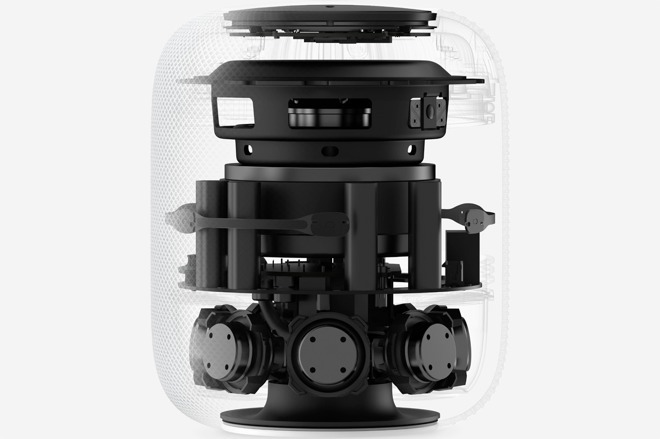Apple on Monday updated its Machine Learning Journal with a post by the company's Siri speech and audio software engineering teams, explaining how the company uses machine learning to help the HomePod hear people under tougher circumstances than iPhones and iPads.
Siri on the HomePod had to be upgraded to cope with loud music, ambient noise, and distant talkers, the journal entry notes. Accordingly the HomePod employs not just far-field microphones, but "mask-based multichannel filtering using deep learning" to strip out echo and background noise, and "unsupervised" learning to split up multiple sound sources and use only the one including "Hey Siri" as a trigger phrase.
The entry goes into considerable technical detail, being oriented mainly towards professionals in the machine learning field. It does however mention that multichannel signal processing happens "continuously" on the HomePod's A8 processor, even in low-power states, and is able to adjust to both changing environments and moving talkers.
Apple suggests that while "other state-of-the-art systems" use multi-microphone processing, they typically only focus on echo and noise reduction.
The HomePod is a relative late comer to the smartspeaker market, having launched just this February — Amazon's Echo debuted in 2014, and the Google Home shipped in 2016. Apple though has taken a different tack than many vendors, concentrating on sound quality with technologies like beamforming. A HomePod will automatically tune itself to match its position in a room.
Siri though has been criticized as limited next to Amazon and Google's voice assistants, for instance only natively supporting Apple Music in streaming services. The HomePod hardware is also expensive at $349 — Apple has been rumored as working on a cheaper model to be more competitive.
The journal update coincides with Apple's appearance at the 32nd Conference on Neural Information Processing Systems in Montreal, Canada. The company has tried to open itself more to the academic community, presumably to appeal to potential recruits and to appease the researchers it already has, who previously complained about Apple's paper publishing restrictions.
The Machine Learning Journal is another one of those compromises. It began in July 2017 with a paper discussing neural net training with collated images, and has since gone on to cover a variety of topics, such as face detection and "differential" privacy.
A year ago the company's s director of AI research, Ruslan Salakhutdinov, spoke about the company's self-driving car project, the ultimate purpose of which is still shrouded in mystery. The company may or may not be working on a self-designed car — it at least briefly abandoned the idea in favor of pure platform development.
 Roger Fingas
Roger Fingas






-m.jpg)






 Charles Martin
Charles Martin


 Wesley Hilliard
Wesley Hilliard
 Stephen Silver
Stephen Silver
 William Gallagher
William Gallagher

 Marko Zivkovic
Marko Zivkovic









18 Comments
I'll venture to say that Apple is advancing all their products for the purpose of delivering an amazing car. They aren't interested in selling product through HomePod, but I do believe their HomePod listening advances and Portrait mode camera's (facebook is converting to 3d photos) will be used to advance safety in vehicles. I'm not a tech guy by no means and look forward to reading the opinion of others whom feel the same.
To be honest, I’m Apple freak and HomePod was the only Apple product I bought and returned. Beside listening to music, you don’t have much use for it. I use Amazon Echo more at home because of its capabilities and compatibility. I can get 2 Echoes (2nd generation) and an Echo Sub for $200 and they blow HomePod away!
We've had both Google Home and HomePod in our house for the past 9 months. We don't use the Google much at all - turns out that the "smart" part isn't really very compelling the vast majority of the time, and I'll probably put it back in its box along with its ghastly sub-par audio. The HomePods (we have 2 now) are used constantly as music sources, they sound absolutely great. I still have nearly no use for asking Siri for anything but 1) music and 2) where is iPhone?
I'd consider an Echo for fun, but can't think of anything I want to ask it to do and they sound mediocre. Not yet sold on the voice-command lifestyle except for a few specific tasks.
Once you have more HomeKit automation, the HomePod becomes more useful to turn on and off devices or enable scenes. Hey Siri, set scene dining (or just say hey Siri, dinning) to setup a set of lights in our home. Sure, you could do that with your iPhone but when you're scrambling around in the kitchen it's a lot easier to just talk. Not saying it's worth the expense but it's a nice extravagance. I'd like a smaller HomePod that cost 1/2 as much so I could add to a few more areas in our home. It's nice they started high end but they are expensive.